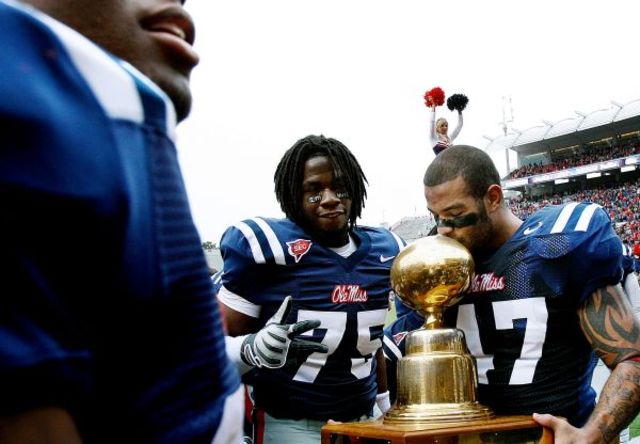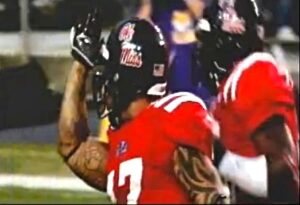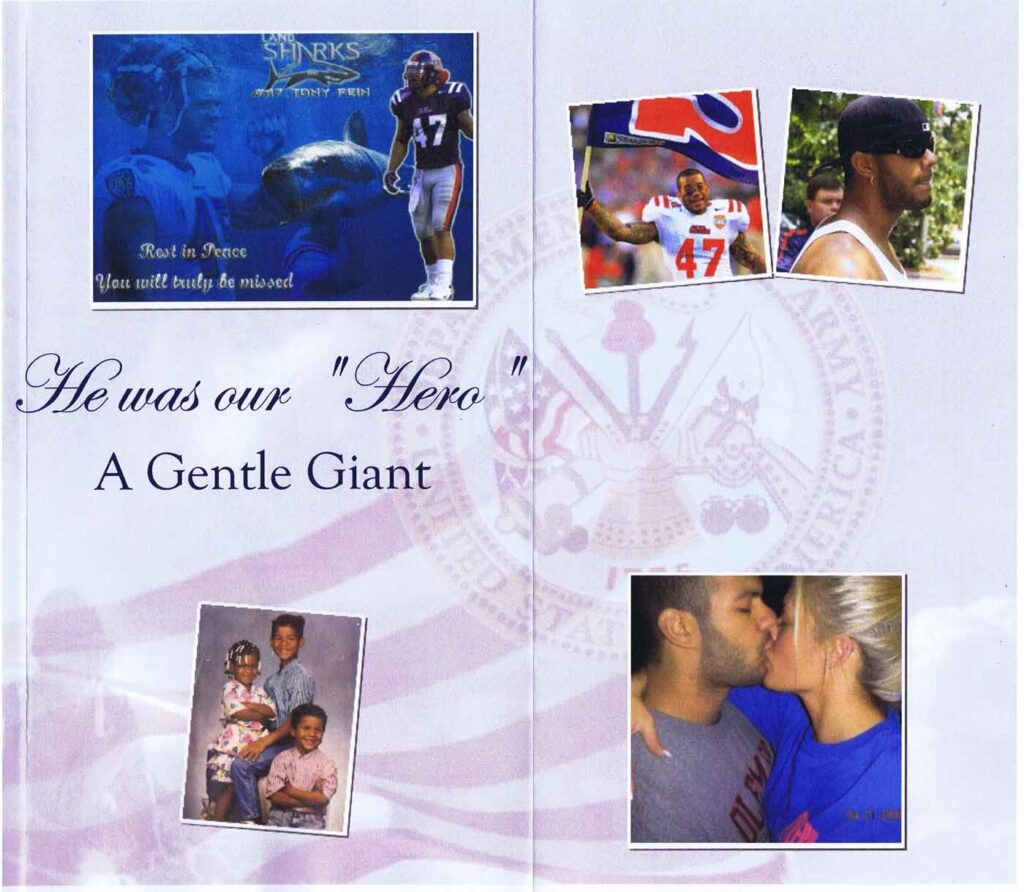
Before the Rebel faithful began throwing up the Landshark, a football player named Tony Fein introduced it to the Ole Miss defense.
Gather ‘round kids, it’s time for a little story about a legend in the making. It’s a true story explaining where the Landshark comes from: a mysterious tale of an Ole Miss Rebel who touched the lives of people across the world. It’s a story about giving credit where credit is due –– of an honorable American who left his mark on the Ole Miss community for years to come.
First, lets take a dive into Ole Miss football history. Just a few years back—2008 to be specific. It’s a hot Gainesville, Florida, afternoon in the Swamp; Tim Tebow and the 4-0 Florida Gators are on their way to an eventual national championship. The Rebels are settling into the first season of the Houston Nutt era. At this point in the season (2-2), Coach Nutt could have easily used a David and Goliath pregame speech. The whole “they might be stronger and faster than us” B.S. you’d expect inside an Ole Miss locker room. Addressing the team, Coach Nutt might have highlighted players whose incessant attitude exceeds their abilities. All in hopes he might inspire the young men who rode the bus eleven hours to win themselves a ball game.

So the story tells itself. Most of us remember the Rebels end up winning 31-30 due to a blocked extra point by Kentrell Locket. The game inspires a famously emotional post-game press conference speech from a young Tim Tebow. You may even recall the Rebel Defense’s forth-and-inches stand on the 32-yard-line, forcing the Gators to turn the ball over on downs with 41 seconds left in the game. It was absolutely awesome. It will forever be awesome. I still own and wear the t-shirt explaining to everyone the game’s stellar awesome-ness.
Bear with me for a minute because we’re about to get a little technical. Do you remember the game saving tackle one yard shy of the first down the Gators so desperately needed on third-and-long of their final possession? They ran an option left, the exact same play they scored on earlier in the 4th quarter. In the ESPN Sports Center replay, Ole Miss player number 47 rushes across field fending off blockers to make a diving tackle. The player silently goes unmentioned by the sports anchors. After the spectacular play, saving grace No. 47 rises to his knees as the camera cuts to miss the unnamed solo-tackler lift his hand to the forehead of his helmet forming an unfamiliar fin-like shape.
We’ll get back to number 47 eventually. What’s more important for now is the funny thing he does with his hand.

In 2008, the camera cuts to miss what appears to be another lousy player celebration. Just five years later, those same cameras wouldn’t miss that money shot for anything. The hand gesture that number 47 was making is known throughout the Ole Miss community as the “Landshark” — an unofficial mascot for the Ole Miss Rebels. Today, pictures of fans of all ages holding up their hand in front of their face can be found all over HottyToddy.com. Somehow, this whimsical sign of celebration has broken the dreaded mascot barrier between fans allowing everyone to rally behind a single figure in support of their team.
The move was first introduced by the Ole Miss defensive players in 2008, and even made the running for the student election for a new mascot in 2010. After Marshall Henderson showed the world his imitation of the move in the 2013 March Madness basketball tournament, the Landshark rapidly gained as much popularity as Auburn’s War Eagle chant, and the Gator Chomp at Florida. As the story holds, the origins of this new Ole Miss tradition points back to player number 47: a pivotal player in Ole Miss football history who’s story has its own Chucky Mullins-like courageous qualities.
So who is this mysterious No. 47?

It’s former Ole Miss linebacker Tony Fein — selected by recruiting fanatic, and former Head Coach Ed Orgeron to be the All-American Junior College replacement for NFL superstar Patrick Willis. The undersized Fein had big shoes to fill, but he made up for the P-Willie physicality he lacked in a maximum amount of effort and drive. The kind of attitude you would expect from an Iraq war veteran. The kind of audacity that wins the 2008 Cotton Bowl.
Fein played both ways, quarterback and linebacker for South Kitsap High School from 1997-2000. He was a well-liked, high profile guy in the small naval shipyard town of Port Orchard, Washington, where high school football is king. His mother is a teacher and his father is a military man. His best friend was his younger brother, Richard “Chird” Fein who later came to Ole Miss at the same time as Fein. Like his father, Fein enrolled in the army after high school at the age of 19. After a four-year tour with fifteen months in Iraq, Fein returned to the states in pursuit of his life-long dream of playing professional football. The goal-oriented Fein then traveled to Scottsdale Community College in Arizona to play linebacker. This is where Coach Orgeron first got word of him. Coming to Oxford at the age of 25, Fein was an older and wiser leader amongst the Ole Miss players. While with the Rebels, Fein was awarded the Pat Tillman Patriot Award by the Military Order of the Purple Heart. The award is presented to those who show a willingness to serve one’s country and still take part in sports.

It was during the two years he spent here (2007-08) that the Landshark emerged as a celebratory sign after big defensive plays. It first happened at practice in the summer before the 2008 season. Fein threw up the sign after sacking Ole Miss Quarterback Jevon Snead. Fellow Ole Miss d-linemen Jerrell Powe and Greg Hardy got a huge kick out of it. Coach Tyrone Nix deserves some credit for letting it go on. He thought it was unique enough to help rally the team to make big plays. Even Coach Nutt in an interview with the Daily Mississippian credits Fein with coming up with the sign saying, “He really invented the (landshark) sign for our guys. I thought he [Fein] came so far in academics, weight room, attitude, team, the whole thing. It was beautiful.”
Fein, the self-proclaimed Landshark, may have picked up the idea during his service in the desert. So it began as a private celebration between Fein and a few other defensive players, but soon they had the whole team and the fans following their lead.
This video from Marcus Kluttz gives an early history of how it all got started.
This is rare footage: a portion of the cut-reel video sent out to NFL coaches. Unlike most players, Fein wanted to be involved in the making of the video.
Up until this point, Fein’s story is indisputably inspirational. A young man, an underdog, standing up in the face of adversity, serving his country, and returning to pursue his life ambition as a professional athlete. It doesn’t get much more picturesque than that, but over the next few months, things start to get complicated for Fein as emotions run thin when your fighting to keep a spot on an NFL roster. Those emotions were tested in August when he was arrested at a restaurant in Baltimore after copping an attitude with a police officer who was wrongly accusing Fein of passing around a cell phone the officer had mistaken for a gun. The assault charges were later dropped.

In September, Fein missed the final cut with Baltimore. He would have to wait until the next season to try out with another preseason team. The 27 year old wasn’t done. He returned home to the Seattle area to continuing training –– staying in shape expecting to try out with another team. A persistent Fein was even discussing the possibility of the Canadian Football League, as many teams were expressing interest. Sadly for Fein, having lived a life full of pure ambition, his chance to achieve the goals set before him would be cut short in a deadly accident.
In the morning of Oct. 6, 2009, The Ravens called Dee Hobbs to tell Tony to get ready. Due to injuries, a spot on their practice squad had opened up and they wanted Fein back in Baltimore. What they didn’t expect was Hobbs mournful response. Tony Fein was dead, the cause of death was uncertain. A wave of news reports broke across the globe from Washington to Arizona to Mississippi to Maryland to Iraq, covering a sweeping variety of readership. His brother Chird took the news the hardest, having looked up to Fein his entire life.
According to Hobbs, Fein had gone to stay with a friend in the city. He had never been much of a drinker, but they convinced him to have some fun. Unaccustomed to the dangers of alcohol, it was 8 o’clock on a Tuesday morning when Fein was found laying on his back having suffocated on his own fluids. A few days passed and autopsies proved that Fein had unintentionally mixed prescription medicine with the alcohol, resulting in an accidental drug overdose.
This is where the news about Tony Fein ends. Tests found a lethal mixture of morphine and anxiety medication in his system, reporters see the (then) pending charges of assault of a police officer, and everyone writes off this great American hero as some troubled soul in a matter of three months. What about everything this man had been working towards? What about his outstanding character, and his service to the country? Where’s the memorial? Where’s the scholarship?
A quick glance at this story, and this is what you see: War Veteran/Aspiring Athlete dies of a drug overdose. Not exactly the honorable discharge we were looking for, but you’re only seeing part of the story if you stop here. Morphine makes people think this guy cowardly turned to hard drugs to cope with being cut from the team, the war, whatever. It’s a drug that sounds fitting for an Iraq veteran and aspiring professional football player who probably suffers from painful back problems. Those who knew Tony personally would attest that suicide was out of question. People just seem to miss the “accidental” part.
Fein would have been a pleasure to coach, treating his teammates and coaches like soldiers and officers. He’s the kind of guy you want in the locker room with the ability to rally his teammates around a common goal. Had Fein’s tragic death been long and slow like the late Chucky Mullins, we might idolize his character in the same way we show respect to Mullins. As the Landshark continues to grow in popularity, we hope to see a trend toward this behavior.

During the second half of the 2009 season, Ole Miss players wore a number 47 sticker on the back of their helmets in memory of the Original Landshark. It has been rumored that Ole Miss Athletic Director Ross Bjork is planning on making a new award in honor of Tony Fein. The award would be mirrored after the Chucky Mullins Memorial Courage Award, which is given to the player that best embodies Mullins’ spirit and courage.
So how do we, as fans, pay our respect to Tony Fein? Easy, keep those Fins Up! Keep throwing up the Landshark anywhere and everywhere, and whenever you do, remember the man who brought change to the Ole Miss community when we needed it the most, providing us the symbol for the Ole Miss Rebels that everyone can appreciate.
William Fowler is a junior integrated marketing communications major at the University of Mississippi. Originally from Hattiesburg, William grew up in Destin, Florida, and has been visiting Oxford ever since he can remember. He has 14 family members who have attended Ole Miss including his parents, grandparents, aunts, uncles and cousins. He is involved in student government and Greek life on campus. He can be reached at wdfowle1@go.olemiss.edu.
